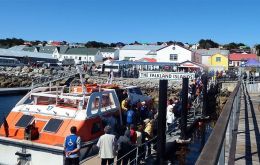MercoPress. South Atlantic News Agency
Economy
-
Thursday, September 24th 2020 - 09:20 UTC
Falklands announces support schemes for the tourism industry

The Falkland Islands Government provided details on Wednesday of a range of support schemes designed specifically to mitigate the effects of the global pandemic on tourism businesses, operators, and employees over the next twelve months, as well as prepare the sector to take advantage of renewed demand in 2021 and beyond.
-
Thursday, September 24th 2020 - 09:00 UTC
New US sanctions on Cuba: ban on the import of cigars and liquors

US President Donald Trump announced new sanctions related to Cuba on Wednesday that will prohibit Americans from staying at properties owned by the Cuban government as well as the import of Cuban cigars and liquor.
-
Thursday, September 24th 2020 - 08:14 UTC
Planning for the Falklands 2021/22 season and beyond

The Falkland Islands Tourist Board has also worked alongside the Government to identify ways in which it too could assist with helping position the sector to take advantage of demand in 2021/22 and beyond. To this end the tourist board has reallocated existing budgets and earmarked funds totaling £380,000 as follows:
-
Wednesday, September 23rd 2020 - 08:54 UTC
EU/Mercosur trade deal ratification delay: Brazil accuses France of “protectionist interests”

Brazil hit back Tuesday at European reluctance to finalize a trade deal between the EU and Mercosur blocs over concerns about Amazon deforestation, saying a French report on the issue was motivated by “protectionist interests.”
-
Wednesday, September 23rd 2020 - 08:47 UTC
Brazil on course to post a record budget primary deficit of US$ 147 billion

Brazil’s government is on course to post a primary budget deficit of 861 billion reais (US$ 157 billion) this year, the Economy Ministry said in its bimonthly revenue and expenditure report on Tuesday, factoring in extended emergency transfers to the poor through the end of December.
-
Wednesday, September 23rd 2020 - 08:44 UTC
Argentine bonds again sliding because of business environment deterioration

Argentine newly issued international bonds are once more on the slide as investors price in rising risks over the country’s economic recovery and much-needed market reforms following tightened capital controls last week.
-
Wednesday, September 23rd 2020 - 08:30 UTC
Trump accuses China of unleashing Covid-19; Xi poses as global leader of multilateralism

U.S. President Donald Trump told the United Nations General Assembly on Tuesday that China must be held accountable for having “unleashed” COVID-19 on the world, prompting Beijing to accuse him of “lies” and abusing the U.N. platform to provoke confrontation.
-
Wednesday, September 23rd 2020 - 08:24 UTC
Falkland Islands quarry enlists crushing and screening train from Sandvik

The Falklands Pony’s Pass Quarry is a busy site at the heart of industrial operations and produces 160,000 tons per annum of quartzitic sandstone using a state-of-the-art mobile crushing and screening train.
-
Wednesday, September 23rd 2020 - 07:50 UTC
“Dear friends in London, please stop playing games”, Germany appeals

Germany’s Europe Minister Michael Roth urged Britain on Tuesday to drop plans for a bill that would break the country’s obligations to the European Union under its withdrawal treaty as time was running out to clinch an EU-Britain trade deal.
-
Tuesday, September 22nd 2020 - 08:57 UTC
EU conditions ratification of trade deal with Mercosur: France and Germany lead objections

The European Union expects a clear commitment from Mercosur countries, particularly Brazil, that it will respect the sustainability issues included in the EU/Mercosur trade agreement, before any deal is ratified.
